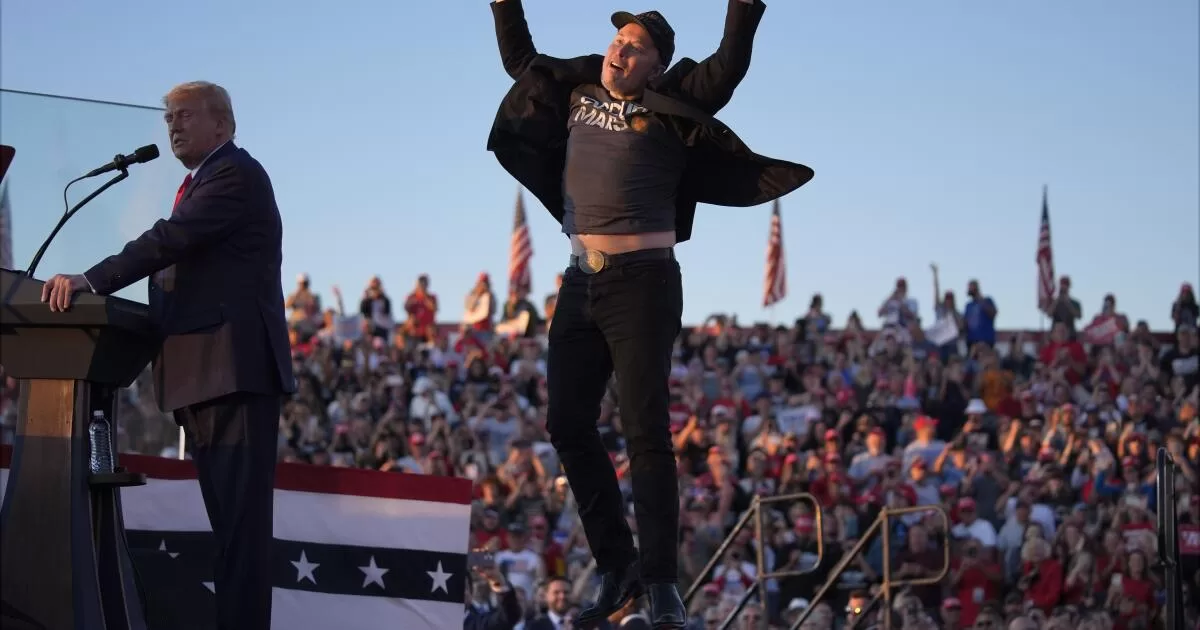Elon Musk’s voter registration lottery scheme is too cute by half and probably illegal. It also illustrates why violations of election law often go unpunished.
Musk announced last weekend that he would award $1 million a day until the election to a randomly selected registered Pennsylvania voter who signs a petition professing support for the 1st and 2nd Amendments. He has already bestowed the first few checks and expanded the sweepstakes to signers from the other key electoral battlegrounds, Georgia, Nevada, Arizona, Michigan, Wisconsin and North Carolina.
Now why would the world’s richest man concoct such a strangely designed game of chance and dangle instant-millionaire status before registered voters? Is he that gratified by attestations of support for the first fifth of the Bill of Rights — though only in swing states and only until the election?
Musk’s game is plainly to harvest new voters for Donald Trump. Both Trump’s campaign and Kamala Harris’ are spending millions of dollars daily in their desperate efforts to persuade and motivate the voters who might tip the apparently deadlocked race. Musk thinks he has hit on a novel and clever way to use his own vast riches to entice voters more directly.
Maybe he has, but his creative method also appears to be illegal. The rub is that he may well get away with it.
Federal law makes it a felony to pay anyone to register to vote, codifying the bedrock principle that people should exercise the franchise based on their free will rather than the purchasing power of a candidate or interest group. The law arose partly because of organized efforts to pay eligible voters to register.
Musk’s ham-handed scheme is designed to induce new registrations of voters who are likely to vote for Trump while appearing to comply with the law. Indeed, it seems likely to appeal to the sort of coveted potential swing-state voter who may not have registered or consistently cast a ballot in past elections. All they have to do to get a shot at a life-changing payout is register — which state and federal law rightly make very easy — and sign Musk’s phony-baloney petition.
The enticement doesn’t ensure that the signers will vote — or that they will vote for Trump — and they may already be registered. But that shouldn’t obscure what the lottery clearly does achieve.
First, it provides something of value to everyone who plays, even if all but one contestant walks away empty-handed. That’s why lottery tickets aren’t free: The chance to make a million has some small value and is often treated as more valuable than it really is.
Second, it induces new voter registrations — imperfectly, yes, but perhaps as or more efficiently than, say, a supermarket registration drive. So what if some of the signers were already registered or or end up failing to vote? Musk and Trump don’t care about those people or whether they go home with checks. What matters is that in the process, unregistered people will have registered. And while it’s conceivable that the contest will produce a few previously unregistered Harris voters, the people who register and sign the petition are more likely to vote for the former president.
The Department of Justice has reportedly sent a letter to Musk’s super PAC, which administers the scheme, advising that it may be illegal. Most law-abiding campaigns would be alarmed by such a shot across the bow. Trump and Musk, however, are more likely to laugh it off.
They may have time and circumstances on their side. In practice, it’s often difficult to stop election law violations in the limited time remaining before the voting concludes, after which it’s effectively too late.
The barriers to law enforcement here are typical of election matters. To begin with, while every voter in the state (or every Harris voter) is arguably harmed by the scheme to manipulate the electorate, it would be difficult to find someone to bring a claim against Musk. The Supreme Court has found that a “generalized grievance” that applies equally to every voter can’t confer the necessary legal standing.
The Department of Justice could sue Musk’s PAC and seek an injunction directing it to cease any unlawful behavior. And it might. But the department’s letter was sent days ago without public comment, and its reported warning that the lottery may be illegal isn’t likely to petrify scofflaws such as Musk and Trump. And it’s well-known that the department is habitually hesitant to do anything that could be perceived as interfering with an election.
Even if the department did secure an injunction, there would be no way to undo the new registrations of likely Trump voters that Musk already has stitched up. The same would be true if the department leveled federal criminal charges against the PAC, the prospects of which are remote for that and other reasons.
That turns out to be a common feature of election law. Remember the notorious butterfly ballot that inadvertently diverted more than 2,000 Floridians’ votes from Al Gore to Pat Buchanan in 2000, more than enough to change the result in George W. Bush’s favor? By the time it became clear that so many voters had been misled, there was nothing to be done.
With the coming election looking even tighter in the polls than the last two, the parties and the country have reason to obsess over tens or hundreds of votes in the swing states that will pick the next president. But elections are inevitably imperfect. Absent extraordinary vigilance and in many cases notwithstanding it, the election could turn on freakish events or even the fruits of a probably criminal scheme.
Harry Litman is the host of the “Talking Feds” podcast and the “Talking San Diego” speaker series. @harrylitman
